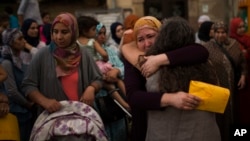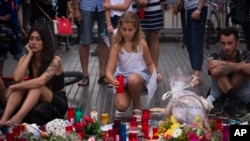They were brothers and boyhood friends from a town with no unfamiliar faces. They were linked by Moroccan roots and equally tied by their upbringings in Ripoll, an ancient hub in the Catalan foothills known for its monastery and passageways dotted with cafes and kebab shops.
But most recently, police believe, the young men were drawn together by an imam and an alleged plot to murder on a massive scale — an extraordinary secret for 12 people to keep for months on end.
In the suspected extremist cell's final days, the group accumulated more than 100 gas canisters, blew up a house in a botched effort to make bombs, drove a van through Barcelona's storied Las Ramblas promenade, and attacked beachside tourists, Spanish authorities said.
The Islamic State group claimed responsibility for the attacks that killed at least 14 people and left scores wounded. Five of the dozen were shot dead by police.
Now, Ripoll is cut off by police roadblocks as the search for an alleged cell member thought to still be on the run continues. Families and friends in the town are torn between horror at the bloodshed and grief for the children they thought they knew.
"We don't know whether to cry and mourn them or what to do," said Wafa Marsi, who knew the attackers and stood with their weeping mothers as they clustered in small groups in the town square. "They have killed 13 or 14 people and wounded a hundred, and we don't know what to do."
What the families finally did, after fiercely debating the issue, was denounce the attack, some holding up homemade signs reading "Not in our name."
Police have identified 12 members of the cell, but three remained unaccounted for Sunday. Two are believed to have been killed when the house where the plot was hatched exploded Wednesday, Catalan police official Josep Lluis Trapero told reporters Sunday.
Complicating the manhunt for the suspected fugitive and any other possible accomplices, though, was the fact that police so far have been unable to pinpoint who remained at large. The explosion in Alcanar, 300 kilometers (186 miles) south of Ripoll, nearly obliterated the bomb makers along with the house. A police official has said the imam, Abdelbaki Es Satty, is thought to be one of them.
Trapero declined to confirm that Younes Abouyaaquoub, a 22-year-old Moroccan, was the one at large and the suspected driver of the van that plowed down the Las Ramblas promenade Thursday, killing 13 people and injuring 120. Another attack hours later killed one person and injured others in Cambrils, a seaside town south of the city.
"We are working in that line," Trapero said. But he added: "We don't know where he is."
Another police official did confirm that three vans tied to the investigation were rented with Abouyaaquoub's credit card: The one used in the Las Ramblas carnage, another found in Ripoll, where all the main attack suspects lived, and a third found in Vic, on the road between the two.
Police are investigating whether a man found stabbed to death inside a car in Barcelona may have been killed by an attacker as well.
Police believe the cell members had planned to fill the vans with explosives and create a massive attack in the Catalan capital. Trapero confirmed that more than 100 tanks of butane gas were found at the Alcanar house that exploded, as well as ingredients of the explosive TATP, which was used by the Islamic State group in attacks in Paris and Brussels.
"Our thesis is that the group had planned one or more attacks with explosives in the city of Barcelona," he said. The plot was foiled when the house in Alcanar blew up Wednesday night.
None of the 12 had any known history of violent extremism, Spanish police have said.
Trapero confirmed the imam was part of the investigation, but said police had no solid evidence that he was responsible for radicalizing the young men in the cell. Es Satty in June abruptly quit working at a mosque in Ripoll and has not been seen since.
"Don't criminalize the mosques because the overwhelming majority of them are places of worship. They are places where people pray," Trapero said. "In fact, even though there is an imam implicated in the group, it doesn't mean that the mosque is where they were radicalized."
One woman who was close to multiple attackers and who heard Es Satty's sermons said the imam repeatedly preached about jihad and killing infidels. She spoke on condition of anonymity, fearing she would be attacked for speaking out.
"I feel like I could have done something. I feel a little bit guilty now," she said. "Everybody knew it. It was an open secret. But I can't say it because these people are dangerous and they could come after me. I don't trust anybody now."
Es Satty's former mosque denounced the deadly attacks, but denied Es Satty was anything other than "a normal imam."
Hammou Minaj, secretary of the mosque who knew the attackers as well, described Es Satty as an easygoing preacher.
"It's hard to get an imam. When you get one, you're always happy," Minaj said.
The mosque is on a main artery in Ripoll named Progress, occupying an unmarked corner storefront. The Muslim community took the space when it outgrew the town's other mosque, which held just 40 worshippers. Es Satty preached first at the smaller space and eventually lost his job in late 2015 for reasons that the president, Ali Yassine, did not specify.
Es Satty then left to look for work as an imam in Belgium from January to March 2016, according to Hans Bonte, mayor of the Belgian city of Vilvoorde.
Vilvoorde is known for Islamic State recruiting and jihadi activity. Police there contacted the Catalan department of justice and were told Es Satty had no links to extremist violence.
"With what we know today, this is remarkable and an eye-opener for everybody," Bonte told De Morgen newspaper.
But Catalonia itself has become increasingly known as a center of extremism and for tensions within the Muslim community on how to handle it. Nearly one-third of the arrests in Spain for alleged links to the Islamic State group were made in Catalonia, according to an analysis last year by Fernano Reinares of the Royal Institute Elcano, a Spanish think tank founded by the king.
When Es Satty returned to Ripoll, he again landed a job as imam — this time at the new mosque. But at the beginning of the summer, Es Satty announced he wanted a three-month vacation in Morocco and the mosque let him go. His apartment was empty on Saturday.
Ripoll resident Marsi, as well others who spoke with the AP on condition of anonymity, admitted tensions brewed at times between the two mosques, although Marsi pointed out that the differences were not over religious content.
"I can't vouch for anybody else, but I can guarantee 100 percent that there was zero radicalization in either mosque. If the imam had said something about jihad, the people of Ripoll would have ousted him. The women, in particular, are raging right now," Marsi emphasized.
The size of the cell and the close family connections among the attack suspects recalled the November 2015 attacks in Paris, where Islamic State adherents struck the national stadium, a concert hall and bars and restaurants nearly simultaneously, leaving 130 people dead.
Catalan authorities have not released the names of those killed, but Spanish media have reported widely that at least three sets of brothers were among the cell's alleged members.
Brothers radicalizing together are a common theme among extremists. They share unbreakable bonds, an ability to keep secrets, and an airtight communication channel. A pair of brothers carried out suicide bombings in March 2016 in Brussels. Two brothers gunned down the staff members of satirical newspaper Charlie Hebdo in Paris in January 2015. Dzhokhar and Tamerlan Tsarnaev, who bombed the Boston Marathon in 2013, were brothers originally from Chechnya.
On Sunday, many in Ripoll said they didn't see themselves in either the young men who had once seemed familiar or the imam now implicated in the investigation
"Those people that heard him talk about jihad and didn't say anything, are they happy now? Why didn't they stop him?" Hassan Azzidi, who was holding a sign that read "Not in the name of Islam," said.
He added: "We are taught not to kill animals for sport, let alone humans."








